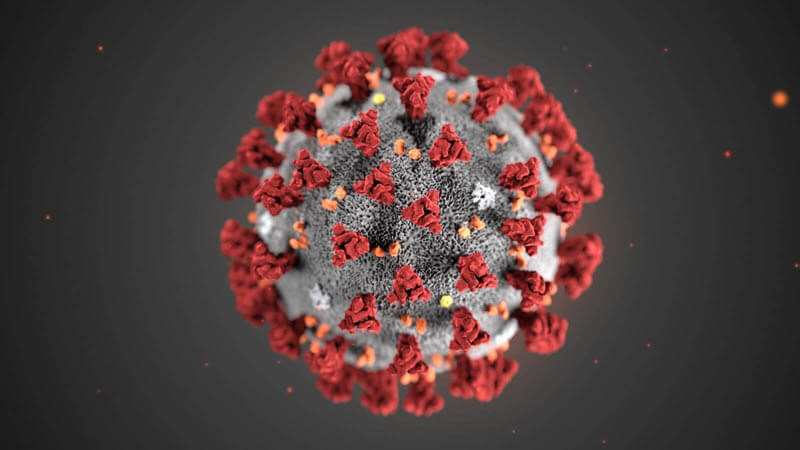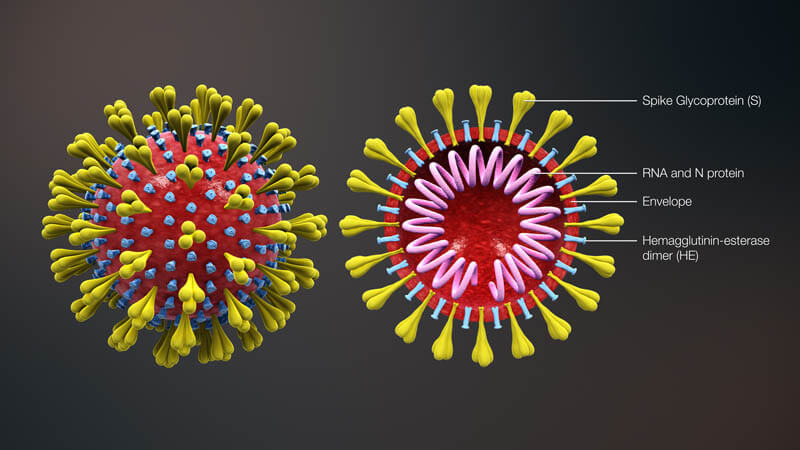2019–20 Coronavirus Outbreak
Location: World Wide
First Reported: Dec 01,2019
Description
The 2019–20 coronavirus outbreak is an ongoing global outbreak of coronavirus disease 2019 that has been declared a Public Health Emergency of International Concern. It is caused by the SARS-CoV-2 coronavirus, first identified in Wuhan, Hubei, China. As of 9 March 2020, more than 111,000 cases have been confirmed, of which 5,800 were classified as serious. More than 100 countries and territories have been affected, with major outbreaks in central China, South Korea, Italy, Iran, France, and Germany. More than 3,800 people have died: more than 3,100 in mainland China and around 725 in all other countries. More than 62,000 people have recovered.Source:Wikipedia
Coronaviruses (CoV) are a large family of viruses that cause illness ranging from the common cold to more severe diseases such as Middle East Respiratory Syndrome (MERS-CoV) and Severe Acute Respiratory Syndrome (SARS-CoV). A novel coronavirus (nCoV) is a new strain that has not been previously identified in humans. Coronaviruses are zoonotic, meaning they are transmitted between animals and people. Detailed investigations found that SARS-CoV was transmitted from civet cats to humans and MERS-CoV from dromedary camels to humans. Several known coronaviruses are circulating in animals that have not yet infected humans. Common signs of infection include respiratory symptoms, fever, cough, shortness of breath and breathing difficulties. In more severe cases, infection can cause pneumonia, severe acute respiratory syndrome, kidney failure and even death. Standard recommendations to prevent infection spread include regular hand washing, covering mouth and nose when coughing and sneezing, thoroughly cooking meat and eggs. Avoid close contact with anyone showing symptoms of respiratory illness such as coughing and sneezing.What is the coronavirus?
The most common symptoms of COVID-19 are fever, tiredness, and dry cough. Some patients may have aches and pains, nasal congestion, runny nose, sore throat or diarrhea. These symptoms are usually mild and begin gradually. Some people become infected but don’t develop any symptoms and don't feel unwell. Most people (about 80%) recover from the disease without needing special treatment. Around 1 out of every 6 people who gets COVID-19 becomes seriously ill and develops difficulty breathing. Older people, and those with underlying medical problems like high blood pressure, heart problems or diabetes, are more likely to develop serious illness. People with fever, cough and difficulty breathing should seek medical attention.Symptoms of COVID-19(Coronavirus-19)?
People can catch COVID-19 from others who have the virus. The disease can spread from person to person through small droplets from the nose or mouth which are spread when a person with COVID-19 coughs or exhales. These droplets land on objects and surfaces around the person. Other people then catch COVID-19 by touching these objects or surfaces, then touching their eyes, nose or mouth. People can also catch COVID-19 if they breathe in droplets from a person with COVID-19 who coughs out or exhales droplets. This is why it is important to stay more than 1 meter (3 feet) away from a person who is sick.How is COVID-19 Spreading?
You can reduce the chances of getting infected by following the below mentioned precautions Wear a Mask Maintain at least 1 metre (3 feet) distance between yourself and anyone who is coughing or sneezing. Avoid touching eyes, nose and mouth. Make sure you, and the people around you, follow good respiratory hygiene. This means covering your mouth and nose with your bent elbow or tissue when you cough or sneeze. Then dispose of the used tissue immediately. Clean your hands with an alcohol-based hand rub or wash them with soap and water. Stay home if you feel unwell. If you have a fever, cough and difficulty breathing, seek medical attention and call in advance. Follow the directions of your local health authority. Keep up to date on the latest COVID-19 hotspots (cities or local areas where COVID-19 is spreading widely). If possible, avoid traveling to places – especially if you are an older person or have diabetes, heart or lung disease.How to Protect myself and others from COVID-19?
As this will prevent the virus from entering your mouth or nose while a person with COVID-19 sneezes right in front of you
Because: When someone coughs or sneezes they spray small liquid droplets from their nose or mouth which may contain virus. If you are too close, you can breathe in the droplets, including the COVID-19 virus if the person coughing has the disease.Source:World Health Organization
Why? Hands touch many surfaces and can pick up viruses. Once contaminated, hands can transfer the virus to your eyes, nose or mouth. From there, the virus can enter your body and can make you sick.Source:World Health Organization
Why? Droplets spread virus. By following good respiratory hygiene you protect the people around you from viruses such as cold, flu and COVID-19.Source:World Health Organization
Why? Washing your hands with soap and water or using alcohol-based hand rub kills viruses that may be on your hands.Source:World Health Organization
Why? National and local authorities will have the most up to date information on the situation in your area. Calling in advance will allow your health care provider to quickly direct you to the right health facility. This will also protect you and help prevent spread of viruses and other infections.Source:World Health Organization
Why? You have a higher chance of catching COVID-19 in one of these areas.Source:World Health Organization
No. Antibiotics do not work against viruses, they only work on bacterial infections. COVID-19 is caused by a virus, so antibiotics do not work. Antibiotics should not be used as a means of prevention or treatment of COVID-19. They should only be used as directed by a physician to treat a bacterial infection.Source:World Health OrganizationIs there any effective Antibiotics for COVID-19?
While some western, traditional or home remedies may provide comfort and alleviate symptoms of COVID-19, there is no evidence that current medicine can prevent or cure the disease. WHO does not recommend self-medication with any medicines, including antibiotics, as a prevention or cure for COVID-19. However, there are several ongoing clinical trials that include both western and traditional medicines. WHO will continue to provide updated information as soon as clinical findings are available.Source:World Health OrganizationIs there any effective Medicine for COVID-19?
Not yet. To date, there is no vaccine and no specific antiviral medicine to prevent or treat COVID-2019. However, those affected should receive care to relieve symptoms. People with serious illness should be hospitalized. Most patients recover thanks to supportive care. Possible vaccines and some specific drug treatments are under investigation. They are being tested through clinical trials. WHO is coordinating efforts to develop vaccines and medicines to prevent and treat COVID-19. The most effective ways to protect yourself and others against COVID-19 are to frequently clean your hands, cover your cough with the bend of elbow or tissue, and maintain a distance of at least 1 meter (3 feet) from people who are coughing or sneezing.Source:World Health OrganizationIs there any effective Vaccine,Drug or Treatment for COVID-19?
It is not certain how long the virus that causes COVID-19 survives on surfaces, but it seems to behave like other coronaviruses. Studies suggest that coronaviruses (including preliminary information on the COVID-19 virus) may persist on surfaces for a few hours or up to several days. This may vary under different conditions (e.g. type of surface, temperature or humidity of the environment). If you think a surface may be infected, clean it with simple disinfectant to kill the virus and protect yourself and others. Clean your hands with an alcohol-based hand rub or wash them with soap and water. Avoid touching your eyes, mouth, or nose.Source:World Health OrganizationHow long does the Virust stays on the Surface?
The “incubation period” means the time between catching the virus and beginning to have symptoms of the disease. Most estimates of the incubation period for COVID-19 range from 1-14 days, most commonly around five days. These estimates will be updated as more data become available.Source:World Health OrganizationHow long is the incubation period for COVID-19?
Coronavirus symptoms: what are they and should I see a doctor?By:The Guardian - 09 March,2020 Coronavirus Live Updates: Governments Clamp Down but Virus Still SpreadsBy:The New York Times - 09 March,2020News and Updates

2019–20 Coronavirus Outbreak
Videos
Coronavirus ‘highly sensitive’ to warmer temperatures
Why new diseases keep appearing in ChinaMore Videos
 Advice for the public
Advice for the public









